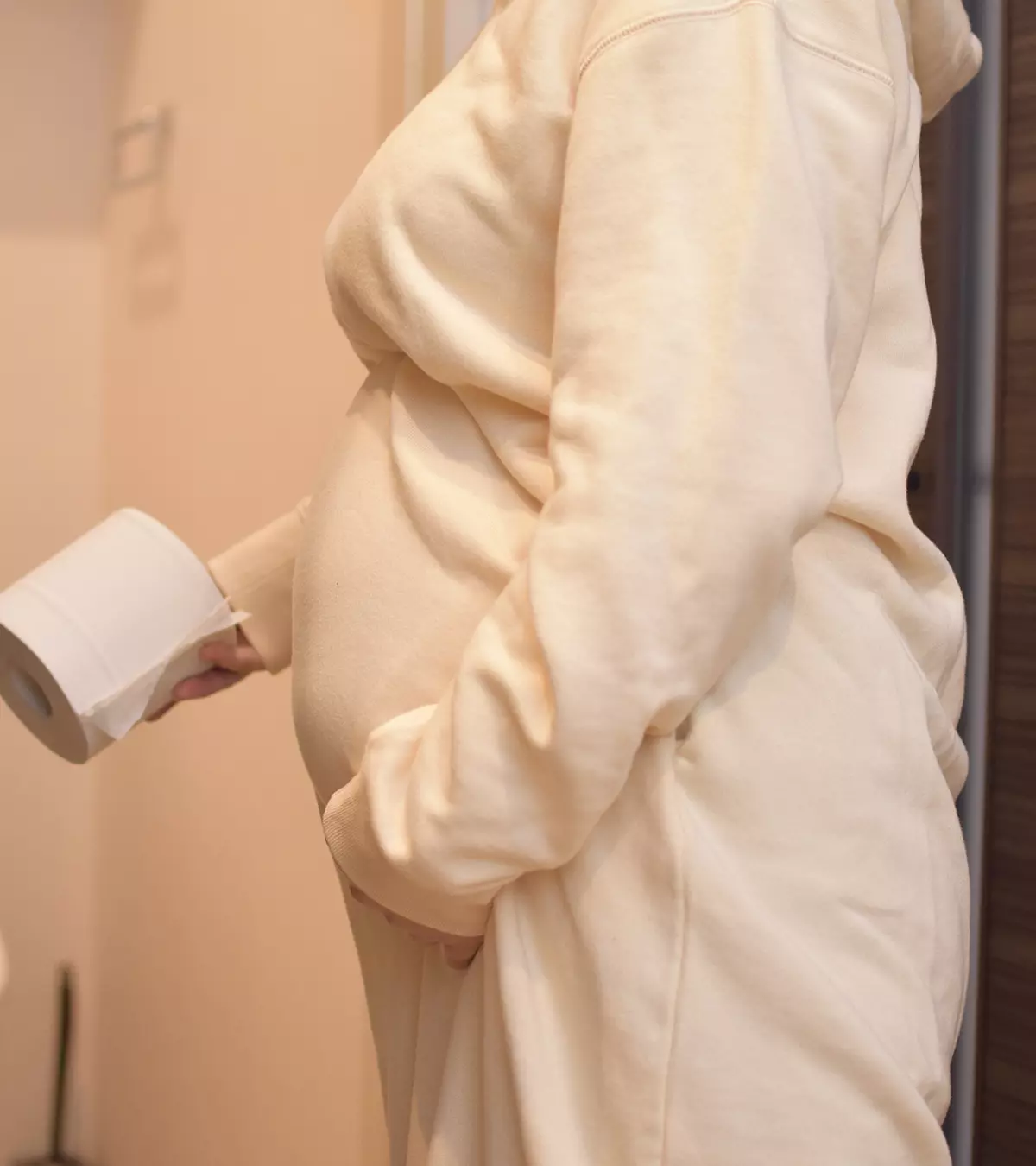
Image: Shutterstock
Pregnancy-related discomforts can make it challenging for women to get enough sleep. It is why several women consider trying melatonin during pregnancy to improve their sleep. Melatonin is a natural hormone that primarily regulates the sleep-wake cycle. It is generally used to treat sleep problems in people over 55 but may also be prescribed to younger individuals in some cases. In the US, melatonin is considered a dietary supplement. Hence, it is available without a prescription. However, its unguided use, especially during pregnancy, may negatively affect the mother and the baby. Read on to know if melatonin is safe for pregnant women, its potential side effects, and safer alternatives.
Key Pointers
- Melatonin is a hormone that plays a vital role in regulating sleep-wake cycles.
- Endogenous melatonin production during pregnancy increases and influences the fetus’s internal clock.
- Melatonin supplements are often used for a short duration to treat insomnia but may not be safe for pregnant women.
- Eating melatonin-rich foods and maintaining a consistent sleep schedule can help improve melatonin production naturally.
- OTC melatonin during pregnancy should only be used under medical supervision.
What Is Melatonin?
Melatonin is a hormone produced primarily by the pineal gland in the brain in response to darkness.
It helps regulate circadian rhythms (24-hour internal clock), such as the sleep-wake cycle, neuroendocrine rhythmsiRhythmic and synchronized release of hormones in response to signals from the nervous system , or body temperature cycles. Exposure to light at night can block its production and affect circadian rhythm regulation (1).
Synthetic melatonin mimics the functions of the endogenous hormone and is used as a dietary supplement to treat/manage primary insomnia, jet lag, sleep problems due to shift work, neurodegenerative issues, and post-traumatic brain injuries. However, ongoing research now aims to understand if melatonin can benefit metabolic, cardiovascular, reproductive, psychological, and gastrointestinal problems (2).
 Quick fact
Quick factIs It Safe To Take Melatonin During Pregnancy?

Melatonin supplementation during pregnancy is typically not advised due to a lack of evidence on its safety in humans. Additionally, animal studies have shown some adverse pregnancy outcomes (4) (5). While some studies suggest that taking melatonin for shorter durations during pregnancy may be safe (6), expecting women should not take OTC melatonin without consulting a healthcare provider.
Over-the-counter melatonin products can contain high doses of melatonin, which can increase its level in the body by up to 20 times above normal. Additionally, the US Food and Drug Administration (US FDA) does not regulate melatonin supplements. Hence, their content may vary widely among products. High melatonin levels may have untoward effects on the growing fetus. Thus, pregnant women should not use melatonin supplements unless directed otherwise by the doctor (7).
Does Melatonin Help You Sleep?

Endogenous melatonin regulates the sleep-wake cycle and a synthetic melatonin supplement may imitate this function. When used for sleep problems, it can make you fall asleep faster and reduce nighttime awakenings. However, expecting women with sleep issues should speak to their doctor or midwife before using melatonin supplements (5).
What Are The Potential Benefits Of Melatonin During Pregnancy?
Endogenous melatonin levels (nighttime) naturally increase during pregnancy, especially after 24 weeks of gestation, and reach their peak after 32 weeks (8).
The hormone can cross the placenta and interact with melatonin receptors in fetal tissues and influence their internal clock. There’s limited research on the potential benefits of melatonin during pregnancy, but some studies suggest it may (8) (9):
- Participate in normal placental development and function
- Act as an indirect antioxidant and protects cells from oxidative damage, thereby improving the immune system responses
- Help develop sleep patterns in fetus late in pregnancy
- Assist in fetal neurodevelopment
- Reduce risk of complications such as preeclampsiaiA pregnancy complication characterized by high blood pressure and protein in the urine and intrauterine growth restriction (IUGR)iA condition where the fetus is smaller than expected for their gestational age
- Enhance the effects of oxytocin and support childbirth
While endogenous melatonin provides various benefits, its effectiveness as a supplement needs extensive research, mainly because the dosage and administration time are the main factors determining its efficacy.
 Did you know?
Did you know?What Are The Side Effects Of Melatonin?

Most individuals taking melatonin supplements will not have any side effects. However, there can be side effects in sensitive cases, such as pregnancy. Take your doctor’s opinion in case you experience side effects. Common side effects are (5):
- Daytime sleepiness or tiredness
- Stomach pain or nausea
- Arm or leg pain
- Headache
- Dizziness
- Restlessness, anxiety, or irritability
- Dry mouth
- Dry or itchy skin
- Strange dreams
- Night sweats
Although rare, there may be some serious adverse effects, such as:
- Feeling of depression
- Watery eyes or blurry vision
- Fainting or feeling faint
- Confusion or vertigo
- Unexplained bruising or blood in the urine
- Symptoms of psoriasisiA chronic, autoimmune skin disease characterized by raised, scaly patches on the skin
Pregnancy-Safe Alternatives To Melatonin
Occasional use of antihistamines such as doxylamine and diphenhydramine is usually considered safe to tackle sleep issues during pregnancy (10)
(11). According to a study published in the Journal of Sleep Research, approximately 38.2% of pregnant women experience insomnia symptoms. Expecting women experiencing such sleep issues may take these drugs under medical guidance. The doctor will determine the root cause of insomnia and prescribe safe medications accordingly (12).
Natural Ways To Increase Your Melatonin Levels

Melatonin can be found in fungi, animal, and plant-based foods. Some of the melatonin-rich foods you can add to your diet to naturally increase your melatonin levels include (13):
- Eggs
- Fish
- Milk
- Lentils
- Nuts such as pistachios
- Grains (preferably whole grains) such as rice, wheat, barley, and oats
- Fruits such as grapes, tart cherry, and strawberry
- Vegetables such as tomato, cucumber, and pepper
- Mushrooms
Some other ways you can up your melatonin levels include (14) (15):
- Regular natural light exposure during the day
- Avoiding screen exposure and bright lights near bedtime, as artificial blue light from electronic devices suppresses melatonin release
 Point to consider
Point to considerSafety Precautions To Follow When Taking Melatonin
You may need to exercise certain precautions if your doctor advises you to take melatonin for sleep issues during pregnancy. They include:
- Inform your doctor about all the medications you are taking to avoid any interactions.
- Avoid melatonin supplements available in combination with other herbs or sleep aids.
- Do not exceed the dose prescribed by your doctor.
- Take the supplement at the same time of the day as instructed by your doctor (17).
- It is not advisable to take melatonin supplements if you have an underlying kidney disorder, liver problem, or an autoimmune condition (5).
- Inform your doctor if you experience any side effects.
What Are Other Ways To Improve Sleep When Pregnant?

Adequate sleep is essential to maintain a healthy pregnancy. Here are some ways you can improve your sleep during pregnancy (18) (19) (20):
- Follow a consistent sleep schedule by going to bed and waking up at the same time daily
- Exercise regularly, but avoid exercising too close to bedtime
- Keep daytime naps short
- Practice relaxation techniques or listen to guided meditation before bedtime
- Take a warm bath or shower to relax before bed
- Indulge in calming activities such as reading a book to calm your mind
- Use aromatherapy by diffusing essential oils to feel relaxed
- Don’t keep electronic items, such as TV and computer, in your bedroom
- Ensure your bedroom is a quiet space with no disturbing sounds
- Moderate the intake of caffeine during pregnancy by limiting drinks such as tea, coffee, and cola and avoid it especially later in the day
- Try finishing your last meal two to three hours before going to bed
- Avoid spicy and acidic food later in the day to reduce discomfort due to acid reflux or heartburn during pregnancy
- Drink plenty of water throughout the day but reduce intake before bedtime to reduce the frequency of nighttime toilet breaks
You may also try cognitive behavioral therapy (CBT), massage therapy, acupuncture, mindfulness practices, and yoga under expert guidance (12). Sleeping on your side while keeping a pillow between your legs or a wedge pillow behind your back may also help you sleep better as your bump grows.
Frequently Asked Questions
1. What if I take melatonin before realizing I am pregnant?
Melatonin supplements have not been reported to cause any harm if taken during early pregnancy. However, it is advisable to stop taking the supplements and consult your doctor if you test positive for pregnancy (21).
2. Does melatonin affect babies in the womb?
Melatonin levels remain high during pregnancy, and taking melatonin supplements may make the levels too high. However, how this may impact fetal development is subject to further research. Hence, pregnant women should take melatonin supplements only under medical supervision (7).
3. Does melatonin cancel out birth control?
Currently, no evidence shows that melatonin interacts with birth control measures.
4. Is 10mg of melatonin too much when pregnant?
Melatonin levels change throughout pregnancy, potentially increasing up to two-fold by the third trimester (8). A standard supplement dose of about 1 to 3mg elevates blood melatonin to 20 times normal. Therefore, taking 10mg of melatonin could cause hormone excess leading to adverse effects.
5. Can melatonin cause preterm labor?
No, melatonin does not cause preterm labor. In fact, some studies indicate that it may help minimize preterm birth risk (22).
6. Where can I purchase melatonin?
Melatonin supplements can be purchased without a prescription from a pharmacy or online drugstore. However, using these products during pregnancy is not advisable. Pregnant women should only take melatonin supplements on prescription.
Melatonin is a natural hormone that regulates the body’s internal clock. Its reduced production in the body can cause several issues, such as insomnia. Melatonin supplements are commonly used to improve sleep. However, the US FDA does not regulate them. Besides, they may contain other herbs and drugs, which may have adverse effects (3). Therefore, using melatonin during pregnancy may not be safe. Endogenous melatonin participates in fetal development and may reduce the risk of pregnancy complications. Avoiding electronic gadgets around bedtime and following a consistent sleep schedule are a few ways to boost the body’s melatonin production naturally.
Infographic: Natural Ways To Improve Melatonin Levels During Pregnancy
Using a melatonin supplement during pregnancy may not be safe. Hence, you may try to enhance the endogenous levels of melatonin to get sufficient sleep. Our infographic below lists natural ways that may help you increase melatonin production in the body. These pregnancy-safe methods boost melatonin production and positively affect your overall health. Illustration: Momjunction Design Team
Illustration: Melatonin During Pregnancy Safety Benefits And Alternatives

Image: Dall·E/MomJunction Design Team
Are you considering taking melatonin supplements while pregnant? Gain clarity through this informative video, shedding light on melatonin’s safety and its implications for expectant mothers.
References
- Sylvie Tordjman et al.; (2017); Melatonin: Pharmacology Functions and Therapeutic Benefits.
https://www.ncbi.nlm.nih.gov/pmc/articles/PMC5405617/ - Rosemary A. Savage et al.; (2022); Melatonin.
https://www.ncbi.nlm.nih.gov/books/NBK534823/ - Melatonin: What You Need To Know.
https://www.nccih.nih.gov/health/melatonin-what-you-need-to-know - Harbindar Jeet Singh et al.; (2013); Effect of melatonin supplementation on pregnancy outcome in Wistar-Kyoto and Sprague-Dawley rats.
https://pubmed.ncbi.nlm.nih.gov/23598870/ - Melatonin.
https://www.nhs.uk/medicines/melatonin/ - Tya Vine et al.; (2022); Melatonin use during pregnancy and lactation: A scoping review of human studies.
https://www.ncbi.nlm.nih.gov/pmc/articles/PMC9169489/ - Is It Safe to Take Melatonin During Pregnancy?
https://womensmentalhealth.org/posts/you-asked-is-it-safe-to-take-melatonin-during-pregnancy/ - SE Voiculescu et al.; (2014); Role of melatonin in embryo fetal development.
https://www.ncbi.nlm.nih.gov/pmc/articles/PMC4316124/ - Salvatore Aversa et al.; (2011); Potential utility of melatonin as an antioxidant during pregnancy and in the perinatal period.
https://www.tandfonline.com/doi/abs/10.3109/14767058.2011.573827 - Diphenhydramine.
https://www.ncbi.nlm.nih.gov/books/NBK582675/# - Doxylamine succinate-pyridoxine hydrochloride.
https://mothertobaby.org/fact-sheets/doxylamine-succinate-pyridoxine-hydrochloride-diclegisdiclectin-pregnancy/ - Cristina A Reichner; (2015); Insomnia and sleep deficiency in pregnancy.
https://www.ncbi.nlm.nih.gov/pmc/articles/PMC4935047/ - Xiao Mengn et al.; (2017); Dietary Sources and Bioactivities of Melatonin.
https://www.ncbi.nlm.nih.gov/pmc/articles/PMC5409706/ - Sleep sunshine & vitamin D.
https://www.thewomens.org.au/health-information/periods/healthy-periods/sleep-sunshine-vitamin-d - Melatonin.
https://www.healthdirect.gov.au/melatonin - Food Safety Risks for Pregnant Women.
https://www.eatright.org/health/pregnancy/prenatal-nutrition/food-safety-risks-for-pregnant-women - Sleep Aids and Stimulants.
https://www.cdc.gov/niosh/work-hour-training-for-nurses/longhours/mod6/10.html - Sleep and Pregnancy.
https://familydoctor.org/getting-enough-sleep-pregnancy/ - Trouble sleeping during pregnancy? Here’s what you can do.
https://healthy.kaiserpermanente.org/health-wellness/healtharticle.trouble-sleeping-during-pregnancy - How to Get Sleep During Pregnancy.
https://www.lancastergeneralhealth.org/health-hub-home/motherhood/your-pregnancy/how-to-get-sleep-during-pregnancy - Mi Kyoung Kim et al.; (2013); Does supplementation of in-vitro culture medium with melatonin improve IVF outcome in PCOS?
https://www.sciencedirect.com/science/article/abs/pii/S1472648312006037 - Melatonin and Pregnancy.
https://womensmentalhealth.org/posts/update-2020-melatonin-pregnancy/
Community Experiences
Join the conversation and become a part of our nurturing community! Share your stories, experiences, and insights to connect with fellow parents.
Read full bio of Dr. Swati Chitnis
Read full bio of Dr. Joyani Das
Read full bio of Rebecca Malachi
Read full bio of Reshmi Das






 Be watchful
Be watchful










